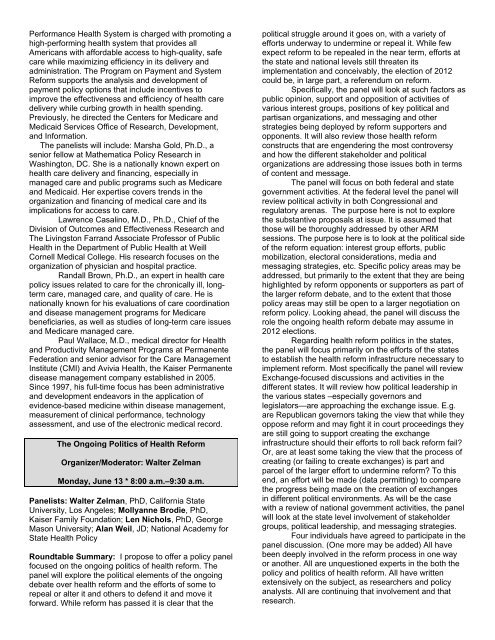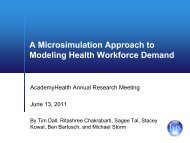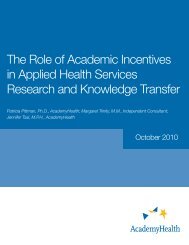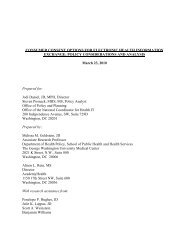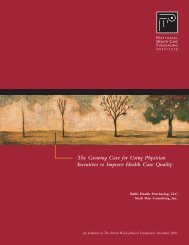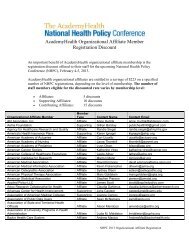Policy Roundtable Abstracts - AcademyHealth
Policy Roundtable Abstracts - AcademyHealth
Policy Roundtable Abstracts - AcademyHealth
Create successful ePaper yourself
Turn your PDF publications into a flip-book with our unique Google optimized e-Paper software.
Performance Health System is charged with promoting a<br />
high-performing health system that provides all<br />
Americans with affordable access to high-quality, safe<br />
care while maximizing efficiency in its delivery and<br />
administration. The Program on Payment and System<br />
Reform supports the analysis and development of<br />
payment policy options that include incentives to<br />
improve the effectiveness and efficiency of health care<br />
delivery while curbing growth in health spending.<br />
Previously, he directed the Centers for Medicare and<br />
Medicaid Services Office of Research, Development,<br />
and Information.<br />
The panelists will include: Marsha Gold, Ph.D., a<br />
senior fellow at Mathematica <strong>Policy</strong> Research in<br />
Washington, DC. She is a nationally known expert on<br />
health care delivery and financing, especially in<br />
managed care and public programs such as Medicare<br />
and Medicaid. Her expertise covers trends in the<br />
organization and financing of medical care and its<br />
implications for access to care.<br />
Lawrence Casalino, M.D., Ph.D., Chief of the<br />
Division of Outcomes and Effectiveness Research and<br />
The Livingston Farrand Associate Professor of Public<br />
Health in the Department of Public Health at Weill<br />
Cornell Medical College. His research focuses on the<br />
organization of physician and hospital practice.<br />
Randall Brown, Ph.D., an expert in health care<br />
policy issues related to care for the chronically ill, longterm<br />
care, managed care, and quality of care. He is<br />
nationally known for his evaluations of care coordination<br />
and disease management programs for Medicare<br />
beneficiaries, as well as studies of long-term care issues<br />
and Medicare managed care.<br />
Paul Wallace, M.D., medical director for Health<br />
and Productivity Management Programs at Permanente<br />
Federation and senior advisor for the Care Management<br />
Institute (CMI) and Avivia Health, the Kaiser Permanente<br />
disease management company established in 2005.<br />
Since 1997, his full-time focus has been administrative<br />
and development endeavors in the application of<br />
evidence-based medicine within disease management,<br />
measurement of clinical performance, technology<br />
assessment, and use of the electronic medical record.<br />
The Ongoing Politics of Health Reform<br />
Organizer/Moderator: Walter Zelman<br />
Monday, June 13 * 8:00 a.m.–9:30 a.m.<br />
Panelists: Walter Zelman, PhD, California State<br />
University, Los Angeles; Mollyanne Brodie, PhD,<br />
Kaiser Family Foundation; Len Nichols, PhD, George<br />
Mason University; Alan Weil, JD; National Academy for<br />
State Health <strong>Policy</strong><br />
<strong>Roundtable</strong> Summary: I propose to offer a policy panel<br />
focused on the ongoing politics of health reform. The<br />
panel will explore the political elements of the ongoing<br />
debate over health reform and the efforts of some to<br />
repeal or alter it and others to defend it and move it<br />
forward. While reform has passed it is clear that the<br />
political struggle around it goes on, with a variety of<br />
efforts underway to undermine or repeal it. While few<br />
expect reform to be repealed in the near term, efforts at<br />
the state and national levels still threaten its<br />
implementation and conceivably, the election of 2012<br />
could be, in large part, a referendum on reform.<br />
Specifically, the panel will look at such factors as<br />
public opinion, support and opposition of activities of<br />
various interest groups, positions of key political and<br />
partisan organizations, and messaging and other<br />
strategies being deployed by reform supporters and<br />
opponents. It will also review those health reform<br />
constructs that are engendering the most controversy<br />
and how the different stakeholder and political<br />
organizations are addressing those issues both in terms<br />
of content and message.<br />
The panel will focus on both federal and state<br />
government activities. At the federal level the panel will<br />
review political activity in both Congressional and<br />
regulatory arenas. The purpose here is not to explore<br />
the substantive proposals at issue. It is assumed that<br />
those will be thoroughly addressed by other ARM<br />
sessions. The purpose here is to look at the political side<br />
of the reform equation: interest group efforts, public<br />
mobilization, electoral considerations, media and<br />
messaging strategies, etc. Specific policy areas may be<br />
addressed, but primarily to the extent that they are being<br />
highlighted by reform opponents or supporters as part of<br />
the larger reform debate, and to the extent that those<br />
policy areas may still be open to a larger negotiation on<br />
reform policy. Looking ahead, the panel will discuss the<br />
role the ongoing health reform debate may assume in<br />
2012 elections.<br />
Regarding health reform politics in the states,<br />
the panel will focus primarily on the efforts of the states<br />
to establish the health reform infrastructure necessary to<br />
implement reform. Most specifically the panel will review<br />
Exchange-focused discussions and activities in the<br />
different states. It will review how political leadership in<br />
the various states –especially governors and<br />
legislators—are approaching the exchange issue. E.g.<br />
are Republican governors taking the view that while they<br />
oppose reform and may fight it in court proceedings they<br />
are still going to support creating the exchange<br />
infrastructure should their efforts to roll back reform fail<br />
Or, are at least some taking the view that the process of<br />
creating (or failing to create exchanges) is part and<br />
parcel of the larger effort to undermine reform To this<br />
end, an effort will be made (data permitting) to compare<br />
the progress being made on the creation of exchanges<br />
in different political environments. As will be the case<br />
with a review of national government activities, the panel<br />
will look at the state level involvement of stakeholder<br />
groups, political leadership, and messaging strategies.<br />
Four individuals have agreed to participate in the<br />
panel discussion. (One more may be added) All have<br />
been deeply involved in the reform process in one way<br />
or another. All are unquestioned experts in the both the<br />
policy and politics of health reform. All have written<br />
extensively on the subject, as researchers and policy<br />
analysts. All are continuing that involvement and that<br />
research.


